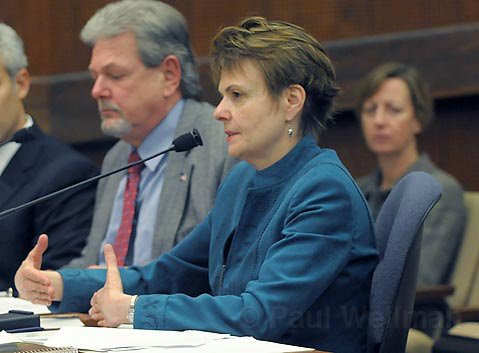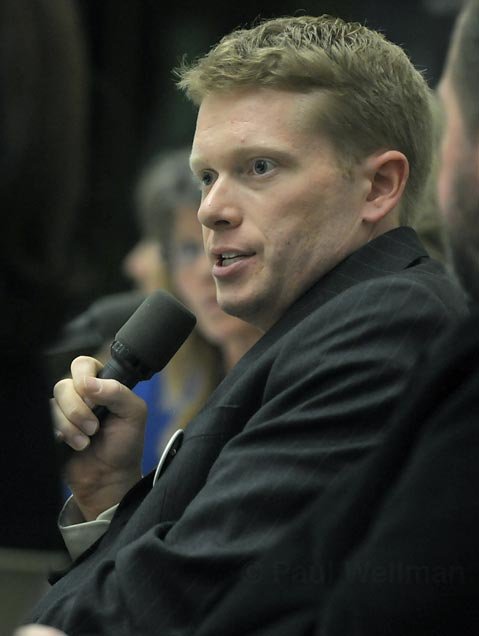Mental Health Cause Pursued
Advocates Undeterred by Hard Times
In an effort to improve services provided to Santa Barbara County’s mentally ill and homeless residents, the Mental Health Commission (MHC) – an oversight body for the county’s Department of Alcohol, Drug, and Mental Health Services (ADMHS) – met with the Consumer Advocacy Coalition (CAC), an organization dedicated to empowering those with a mental illness, on February 19.
One of the first to speak, ADMHS Deputy Director Marianne Garrity provided data regarding Medi-Cal claims for Santa Barbara County Mental Health in comparison to California as a whole as well as other medium-sized counties. The data – which was criticized by one attendee given its most recent findings were from 2007-2008 – took into account, among other things, the percentage of clients deemed eligible to receive services. Although the average penetration rate (the percentage of people who actually receive treatment out of all those eligible) for Santa Barbara County was between six and seven percent – a figure higher than that of other medium-sized counties and the state as a whole – it nevertheless placed Santa Barbara County 37th (out of 58 counties). The data presented also showed a steadily declining penetration rate statewide since 2005.

Also speaking on behalf of the county, ADMHS director Dr. Ann Detrick emphasized some of the resources available to people who are mentally ill or homeless or both. Detrick lauded El Carrillo, a permanent-housing complex for the homeless; C.A.R.E.S, an emergency services operation with locations in both North County and South County; and the ACT Team, a resource for mentally ill individuals.
Nevertheless, CAC executive director Roger Thompson believes the MHC could use some restructuring. On hand to make suggestions and discuss findings of his own, Thompson – along with lawyer Emily Allen and CAC volunteer Darla Kaiser – was met with some resistance.
Upon Kaiser’s suggestion that the MHC should better reflect Santa Barbara County’s demographics – most MHC documents are only in English, while most of the county’s population is Latino – 5th District Chairperson Margie Lopez insisted that such information was neither slated for the meeting nor relevant, prompting a debate between MHC and CAC.
Allen expressed some surprise about the argument. “The Commission did not seem to like the direction the presentation was going. However, CAC is an advocacy group that monitors the Mental Health Commission. CAC has some serious concerns with the oversight this commission has provided in the past and wants to see improvements.”
Noting that the MHC “didn’t take the criticism too lightly,” Thompson added, “Understanding what the Commission does is a benefit to our constituents rather than a detriment.”
Perhaps most frustrating to Thompson was the fact that, due to the agenda’s strict allocation of minutes, more time was spent arguing about CAC’s right to present than was finally allowed for CAC to make its presentation. “It was very unprofessional,” Thompson said.

Although unable to speak in great detail about CAC’s suggestions for the MHC and its advocacy work in general at the meeting, Thompson and Allen made CAC’s role known during subsequent interviews.
Thompson deemed the protection of the Mental Health Services Act (MHSA) “our highest priority.” Born of legislation passed by California voters in 2004, the act was designed as a means of further funding the state’s mental health system by imposing a one percent tax on individuals who make more than $1 million per year. Eager to speak out on behalf of MHSA – in jeopardy due to Governor Schwarzenegger’s budget prioritizing – Thompson visited the State Assembly last year.
Based on Thompson’s comments, it would seem that many misconceptions surround MHSA, namely that it is costing the state money. Not so, assured Thompson, who said that it would cost the state more should MHSA be cut. Furthermore, according to Thompson, MHSA has a lot to offer, with 80% of its funding funneled into the expansion of existing mental-health programs, and the remaining 20% going into the creation of new programs.
The CAC’s Homeless Bill of Rights is one of the self-empowerment organization’s key documents. It is a 10-item list of protections that should be afforded to all permanent residents notwithstanding their mental health status. It has been signed by the Mental Health Association, the Santa Barbara County Action Network, the Unitarian Society of Santa Barbara (a group heavily praised by Thompson), the Democratic Women of Santa Barbara County, and the Progressive Democrats of Santa Barbara County. The CAC has high hopes for the message, especially given its recent consideration for national acceptance by the National Coalition for the Homeless. “It’s something we can all agree on,” Thompson said.
While he is not currently in complete agreement with MHC on all points, Thompson still hopes his suggestions will help pave the way for a better future. One of his biggest concerns is the fact that, according to Thompson, the MHC has failed to file its annual report – a report legally mandated by the state – since 2002. “If the oversight body [MHC] is not functioning correctly, perhaps that is a contributing factor to the disarray of it,” he said.
Thompson also recommends the use of technology such as webcams to make the commission’s meetings more inclusive for interested community members, given that they are always held in Santa Barbara as opposed to in Santa Maria or Lompoc.
Despite disagreements, Thompson believes that a collaborative effort is the key to success. “We all need to work harder if we’re going to improve the system,” he said.



